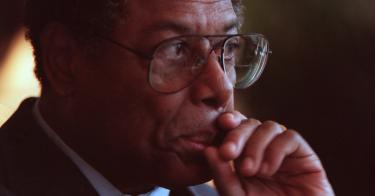We’ve heard a lot lately about how 2016 was such an awful year. Usually that thought is prompted by the death of a beloved celebrity, and there’s no question that we lost some talented people.
But there are other kinds of loss. Case in point: Thomas Sowell’s column.
The great man himself, I’m very glad to report, is alive and well. But last month brought the unwelcome news of his retirement. That was the last thing anyone who appreciates his clear, rational, evidence-based thinking wanted to hear.
I can’t blame him for making such a decision at the age of 86. He’s been writing on a wide variety of topics for more than 50 years. That’s a long run.
But in a time when political commentary is increasingly dominated by rage and recrimination, his voice of calm, reasoned discourse was like an oasis in the desert. We need him now more than ever.
To write clearly about any topic involves work, but to do it about economics? To not only understand the movements of “the invisible hand” (to use Adam Smith’s famous phrase), but to make it relatable for others who lack advanced degrees? That takes real skill.
And Tom has the degrees. A bachelor’s from Harvard University. A masters from Columbia University. A doctorate from the University of Chicago. It was at the last institution that Mr. Sowell, a self-described Marxist in his 20s, met the remarkable Milton Friedman.
What he learned from Friedman, and his subsequent time as an economic analyst at the U.S. Department of Labor, proved to be a real eye-opener.
Experience, they say, is the best teacher. Consider this from his book “A Personal Odyssey”:
“In the summer of 1959 I worked as a clerk-typist in the headquarters of the U.S. Public Health Service in Washington. One day, a man had a heart attack at around 5 p.m., on the sidewalk outside the Public Health Service.
“He was taken inside to the nurse’s room, where he was asked if he was a government employee. If he were, he would have been eligible to be taken to a medical facility there. Unfortunately, he was not, so a phone call was made to a local hospital to send an ambulance. By the time this ambulance made its way through miles of Washington rush-hour traffic, the man was dead.
“He died waiting for a doctor, in a building full of doctors.
“Nothing so dramatized for me the nature of a bureaucracy and its emphasis on procedures, rather than results.”
Want to really understand economics? No college course beats reading Mr. Sowell’s “Basic Economics.” Want to know why the market tanked in 2008? Read “The Housing Boom and Bust.” The list goes on. His books are marvelously clear and devastatingly well-researched.
He was well known to his fans for being able to cast some real zingers. Like this one on diversity: “The next time some academics tell you how important diversity is, ask how many Republicans there are in their sociology department.”
Or this one on taxes: “Our tax system penalizes those who are producing wealth in order to subsidize those who are only consuming it.”
We at the Heritage Foundation were early fans of Mr. Sowell’s work. In fact, we were the first to syndicate him. When we sold Heritage Features Syndicate to Creator’s Syndicate, he was one of four columnists they retained.
“Being old-fashioned, I liked to know what the facts were before writing,” Mr. Sowell wrote in his farewell column. Perhaps the best tribute we can pay him is to demand no less from ourselves and others.
I don’t know what lies ahead. But I know I’ll miss having Thomas Sowell around to help make sense of it.
This piece originally appeared in The Washington Times




